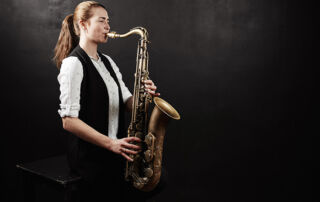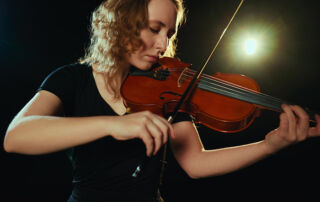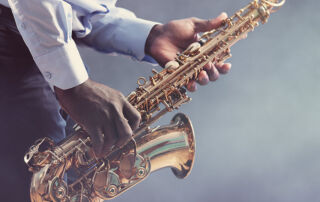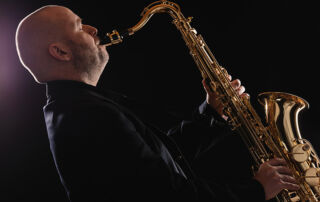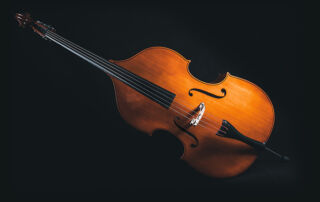There are often disputes between musicians as to which of these two ways of playing music is best. The ear players see their way as best and the note-reading players say “no our way is best!” So what would be the best way for you to learn to play the piano or an instrument?
Let's look at playing from music sheets and not playing by ear.
A great advantage of playing by sight is being able to read music pieces from score - even if you have never heard them. It opens the way to “reading” many books or sheets of music. For those who can not read music this area of simply picking up a score and playing it, discovering new music is lost. It's very much like reading a book or the newspaper.
- Being able to read and play music from a score gives the player the ability not only to: know the written language of music but also gives you a greater knowledge of how music is formed, written and plotted out.
- It gives a visual layout of the music.
The negative about reading and playing from a score is that often the player is less aware of the sound created and the chord structure and overall movement of the piece.
I have often found that when I am reading the score, it is as if your ear tends to shut off a bit. One has to actively involve the ear to take note of the movement of the melody and chords.
Playing only by reading and not by ear means that you will not be able to simply sit down and play impromptu at any moment. This is a great privilege to those who play by ear, being able to simply sit down and play anything that comes to mind or rather to ear!
There is a lot of freedom in being able to play by ear.
A lot of enjoyment comes from being able to create music on the spot or to “improvise”. (I am not referring to Improvising on jazz chords while playing with a band - which calls for serious development, practice and hard work and of course the joy of serious improvising.)
Playing by sight means that the player will have a very thorough understanding of the theory of music. Understanding clefs, key signatures, note values, dynamics, etc. etc. Having this knowledge always helps the serious musician. This does not mean that players by ear have no idea of note reading!
Many players by ear have the basic understanding and knowledge of sheet music, written music and theory. If you play by ear, it only enhances your playing to know the basic theory of music and how to read and write music.
Let us recap:
Having the ability to play by sight means:
- You can read music sheets and learn new music even if you have not heard it before.
- It gives you an edge in having the knowledge of music and its theory.
- If you want to be a serious musician, reading music or being able to play from a score is not an option.
- For the academic type of person or the more intellectual person who loves studying - playing by sight is much more secure and preferable seeing that everything has been written down and laid out. There is no uncertainty in what has to be played. This is a security factor for many students who often find it easier to read a line and know what they are playing, rather than trying to fumble about by working out something by ear.
Being able to play, for example, a Bach-like Prelude and Fugue or a Toccata can give one great pleasure! This is also the reason why many who have been classically trained by reading music often struggle to make the jump from score reading to playing by ear.
I had to force myself to put all my books away for at least a year or two and only to play by hearing, that is listening to melodies and working them out. I also learnt many of my classical masterpieces by remembering how it sounded and trying to work them out by ear.
Of course, it helped because I had played them before from the score. I only grabbed the book when I got stuck. This helped not only with memorising or remembering the music but it became easier to interpret what the composer had in mind, as my ear was the only thing I could lean on. There were no pages of written music in front of me! I found it helped in a great way. It meant that I could not really forget the pieces once I called on the ear to bring it all back and follow the ear.
Playing properly by ear - without music notes, but only by hearing, is a great plus as it leaves open a great door for creativity for the player.
In the beginning, when playing by ear, (if you are not used to it), can be quite frustrating! But if you keep at it, bit by bit, new sounds will come, and new ideas of what and how to play will develop.
The greatest advantage of playing by ear is the great freedom and joy it brings the player.
- There is no fear of playing wrong or thinking where am I on the score.
- Many classical students suffer from the: “I am playing wrong” mentality. Classical pieces ask much from the player to be “perfect” in fingering, notes etc. And yes it has to be perfect to be good! Unfortunately! But learning these pieces and the joy it brings is worth it. There is a feeling of conquering and winning that makes it worth it! So do not stop playing your classics or reading your scores!
- When playing by ear and/or creating your own music - there is the great plus of having no right or wrong!
- Of course, there are better-sounding lines or chords but no one can ever tell you you are playing wrongly! I have found many reading-trained students being very relieved to find out that they could play anything that they felt sounded good.
Playing by ear is, from my viewpoint - (being a trained classical and jazz musician), a very important area that has been overlooked for years by the classical arena. It means that many students learnt to play only from a book but have very little freedom on their instrument or have never been taught how simple chords look, or how to create tunes etc. This needs to be developed from day one!
To conclude: I think both being able to play from a score, as well as being able to play totally by ear is extremely important for any serious musician.
In the end, for the adult learner, I think it depends a lot on you as a person. It depends on what works for you.
- Do you love to meticulously read and work out a score and play that way? Then enjoy that!
- Or would you love to play by ear, working out melodies and sounds - being creative in this way?





